A Foreign Lady in Beijing
The top story at Nanfang Daily today was titled "Foreign Auntie Challenges Rule-Breaking Vehicle." The story was originally posted by blogger known as Lao An (老安, Old An). The original blog post was titled "A foreigner helps the Chinese to improve their civic quality."
Here is the translation of the text:
At around 8:50am on October 20, 2006, on the road from the Zhaoyang East bridge towards the Blue Island Building, a funny episode occurred: a foreigner acted as traffic police and made a small sedan which had gone into the bicycle lane move back out into the car lane.
By the time that I got there, a foreigner had stopped and held her bicycle in the bicycle lane in front of a silver car (license plate number HL ****). She was smiling and saying something to the driver while making gestures. At first I went past and I did not take any photographs. Then I saw the foreigner go past the car and stopped her bicycle in front of the car. So she was trying to get the car to go back into the car lane instead of being in the bicycle lane. This went on for a few minutes. The driver got mad and got out of the car to curse the foreigner. He even picked up the bicycle and hook it. Even so, the foreigner would not budge and she insisted that the car get back on the car lane.
Finally, the car turned back into the car lane. The foreigner then blocked the next car (a white Santana), which quickly retreated and went into the car lane.
The whole incident occurred in under 10 minutes and drew quite a few spectators. After the foreigner left, the spectators commented: "The Chinese really need to be educated this way!" Dear brother and sister readers, what do you think?
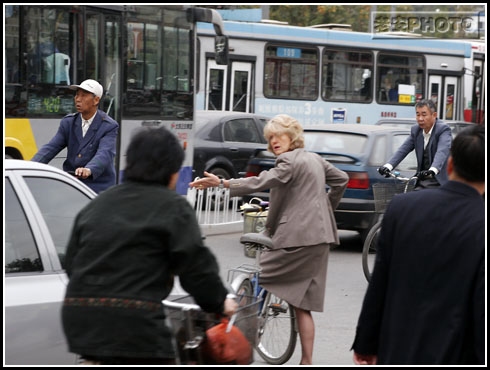
The foreigner catches up to the car and stops in front of it.
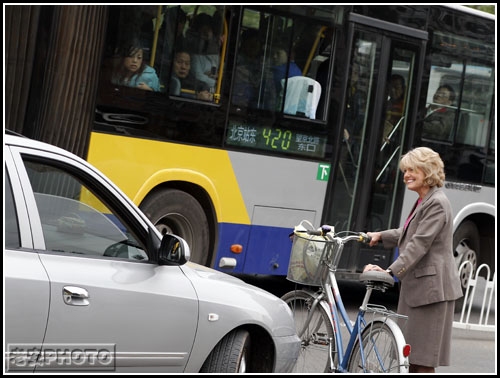
She holds her ground and maintains a smile.
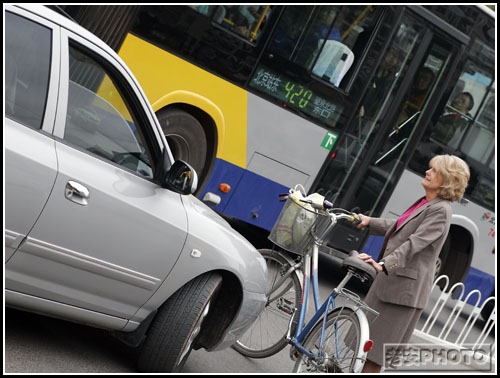
She will not budge
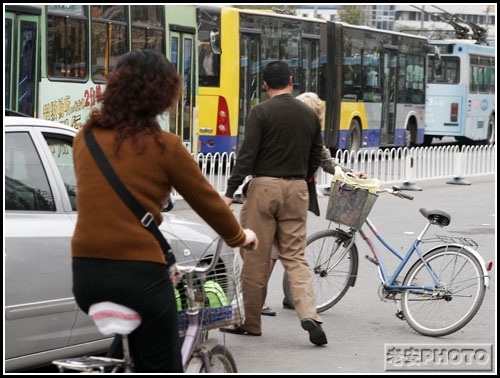
The driver gets out and pushes the bicycle.
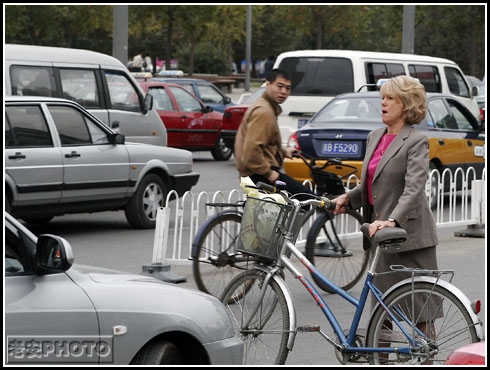
But the foreigner holds her ground.
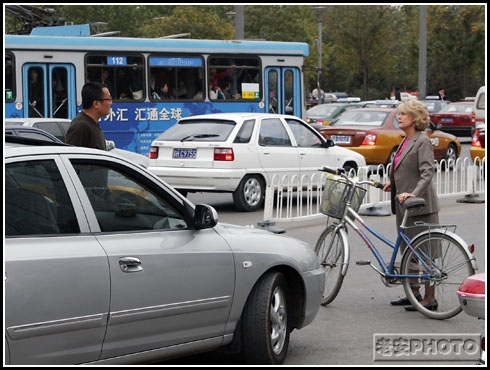
The driver gets out again and demands: "Are you leaving or not?"
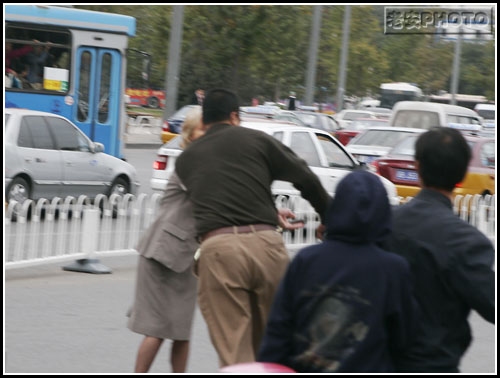
The driver picks up the bicycle and threw it on the side.
He said: "If you block me again, I'll throw it even farther away!"
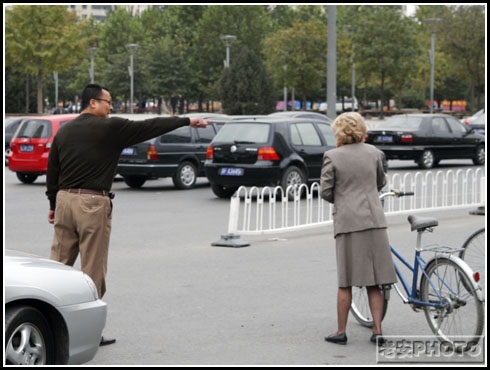
"Go home and mind your own business!"
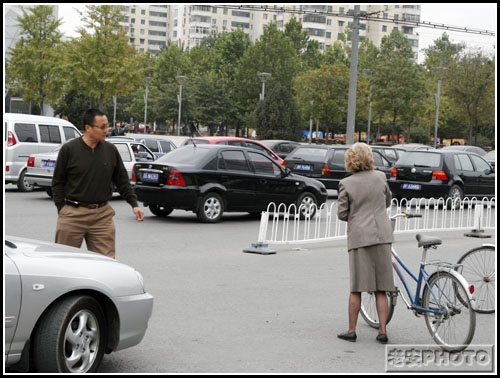
But she does not leave.
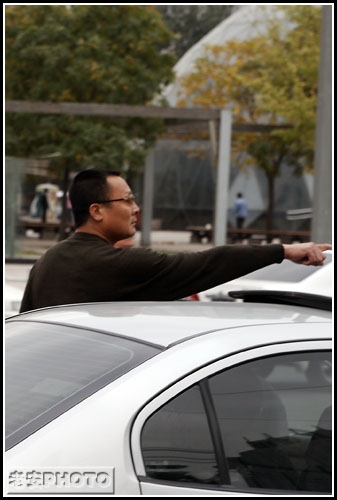
"If you block me again, I won't be polite anymore!"
(but he drives into the car lane all the same)
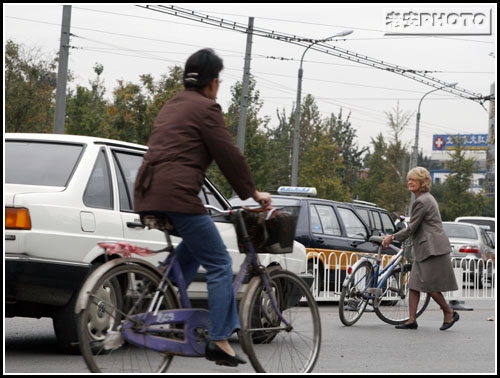
The foreigner now blocks a white Santana that entered the bicycle lane.
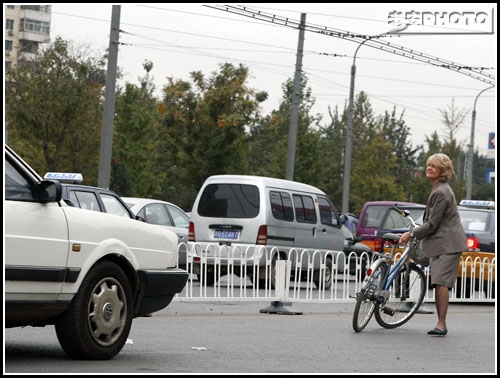
This car quickly backed up and retreated into the car lane.
(China Daily) Driver sorry for throwing foreign woman's bike. November 16, 2006.
A Beijing driver who infamously threw aside the bicycle of a foreign woman who had blocked his way has apologized to her on television.
The driver, surnamed Niu, apologized in response to a barrage of criticism after photographs of the incident were plastered on the Internet.
"I must say sorry to the foreign lady. I acted too rashly at that time. I shouldn't have thrown her bicycle to the ground," Niu said on a popular Beijing TV programme.
The incident ocurred after the woman confronted Niu, assuming he had been driving in a bicycles-only lane. Niu said had not violated any traffic rules. Traffic police testified that he had been driving on a road of mixed traffic, open to both cars and bicycles.
The incident had hurt him and his family greatly, said Niu, noting he had changed his home phone number.
Internet users had bombarded him with phone calls denouncing his behaviour of October 20.
Many websites carried photos of the incident. A foreign woman stands in front of a car, her finger pointing to the centre of the road. The driver, infuriated, gets out of the car, grabs the woman's bicycle and throws it to the ground.
The pictures were uploaded on October 20 and spread to other websites, sparking an outpouring of sympathy for the foreigner and denouncements of the driver.
"All netizens please help find the identities of the driver and the foreign lady," said one posting.
The much-read posting, written by popular blogger Mo Jie, also called on netizens to denounce the driver. "We must get him to realize that his behaviour is smearing the country's image and the face of Beijing," said the posting.
Netizens quickly answered the calls to name the driver, posting his home phone number and other personal information on the Internet. Some netizens said the foreign woman worked for an American company near the scene, but no further information about her was revealed.
"The incident shows two things," says one of the blog articles. "It shows the Chinese are self-reflecting people and readily accept positive criticism. It also shows the terrifying power of the Internet, its power to mobilize people and bare secrets."
(SCMP) Cyclists and drivers at war on teeming city streets. By Cynthia Li. December 4, 2006.
The one-on-one confrontation between a frustrated cyclist and a motorist in a Beijing bicycle lane was unremarkable. But when a blogger posted pictures of the incident on the internet last month, it became a national rallying cry for commuters on two wheels.The female cyclist, apparently an expatriate, stood in the middle of the cycle lane with her bike, refusing to budge for the car, before the bike was pushed away by the motorist. The woman's identity remains a mystery but the car owner was forced to apologise on national television after a chatroom-fuelled furore erupted over the rights of cyclists.
Cyclists and motorists are at war in Beijing and other major cities as China transforms itself from the kingdom of bicycles to the kingdom of cars. The Beijing Youth Daily ran a whole page on Thursday on the rights of cyclists and their situation in Beijing, which highlights the significance of the issue.
Despite its environmental and health benefits, bicycle riding is losing out in popularity and government influence to the growing number of cars crowding city streets.
In 1993, the average Beijing household of 3.6 people owned two bicycles, according to official data, and, although the city now has two bikes for every three people, only about one quarter of them are used every day. In contrast, car ownership has grown 22 per cent a year since the 1980s to the point where Beijing has an estimated 2.8 million vehicles.
In the Netherlands, bicycles account for more than half of the country's transport, while in Germany the central government allocates €100 million (HK$1.04 billion) a year for bicycle lanes. British authorities are paving 10,000km of bike lanes over the next six years, the Beijing Youth Daily reports.
But as European cities encourage residents to rediscover pedal power, mainland metropolises are rolling out the bitumen for car-centred transport systems. Peking University sociologist Zheng Yefu says the oft-cited claims that higher car ownership is a sign of higher living standards courtesy of a booming economy are a deceit. He says it is a burden, not an asset. "All the talk about GDP is a lie. You do earn more, but you have to spend more too," Professor Zheng says. "Encouraging private car purchasing is to steal time from people ... Time is life itself. And the amount of space for each person becomes less and less, and cannot increase." He says overseas studies indicate that car owners in America spend four hours a day driving and maintaining the vehicle but bicycle riding and public transport take less time. Roads and car parks also consume valuable space, he says, up to half of the available land in Los Angeles.
Hu Huizhe, from the environmental non-government organisation Friends of Nature, told the newspaper that bikes were the most suitable transport in the capital and had the edge over cars during rush hours. "The average speed of motor vehicles is 8-12km/h during rush hour, but the usual speed of bicycles is 15km/h."
According to official data, bicycles accounted for 31.5 per cent of traffic in Beijing in 2004, and walking and cycling will remain major transport means in the future, according to 2004-2020 plans for the capital authorised by the State Council. While cyclists are still the majority in China, they must contend with poor legal protection, social discrimination and unsympathetic city planning.
An ongoing China Central Television survey has found that of the 5,500 people questioned so far, more than 85 per cent thought the rights of cyclists were largely ignored in Beijing, with lane encroachment by cars and trucks the most frequent violation. They also must deal with the physical threat posed by cars, a danger Beijing student Wang Lan knows firsthand. She has stopped riding her bike since she was hit by a speeding Audi two years ago. "I received 200 yuan from the driver - not even enough to replace my crumbled bike," Ms Wang says.
The Beijing Traffic Management Bureau says that in 2001 one cyclist died on the city's roads every two days and 200 people died in accidents between motor vehicles and bicycles from January 2004 to July last year. Nationally, pedestrians and cyclists are the most frequent victims of traffic accidents. A compulsory driver's third-party insurance scheme to cover compensation for a motor vehicle accident was introduced in 2004.
But lawyer Li Hongsheng from the China Traffic Accident website - a platform to connect traffic accident victims with legal advocates - says the clauses are ambiguous and not strong enough. "The indemnity is too low - the compensation is no more than 60,000 yuan altogether," Mr Li says. The risk to cyclists increases when motorists try to circumvent traffic jams by taking over bicycle lanes, with the encouragement of urban planners and authorities.
In Beijing and many other cities, bicycle lanes have been divided into two parts, with one part becoming the side roads for motorists. Even so, it is common for motorists to park their cars on the bicycle lanes along the kerb, posing even bigger dangers to cyclists.
Environmentalist Liang Congjie , a member of the Chinese People's Political Consultative Conference (CPPCC), says that in some cases planners do not even allot space for cycle lanes. Mr Liang submitted a proposal to this year's CPPCC session for formal acknowledgment of the rights of cyclists, something that became an even more personal issue after he was hit by a car this year.
Peking University's Professor Zheng says cyclists should also get more social respect. He tried to get into the Diaoyutai State Guesthouse seven years ago for a conference but was told to leave his bike at the gate. Inside, cars filled the courtyard.
The lack of secure bike parks is a big problem for cyclists so many have turned to fold-up models.
An even bigger deterrent to cycling is the city's approach to urban planning. Beijing's urban sprawl is expanding but its major areas are still downtown, concentrated within the second ringroad. "Most people choose not to ride bicycles simply because Beijing is too large," says commuter Wang Qiang.
But there is cause for optimism. The Beijing Bike Carnival has become an annual celebration of all things two-wheeled and Friends of Nature has tried to lift grassroots awareness of cycling, all with little government support.